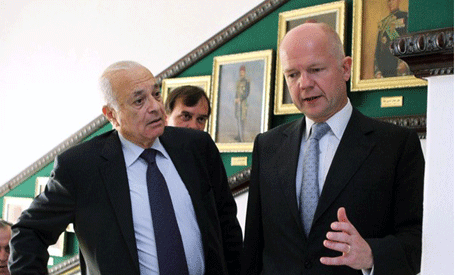
Former Egypt Foreign Minister Nabil al-Araby (currently Arab League Secretary General) and British Foreign Secretary William Hague, May 2011 (Photo: Reuters)
The British government is not worried about an Islamist government in Egypt and believes such a government would adopt a realistic approach towards Israel, according to a senior UK diplomat.
Islamists are aware that they have to concentrate on fundamental issues, such as education, public sector pay, social inclusivity and public health, according to the diplomat.
“I find that a lot of the people we have been talking to who have got into parliament are well aware that those are the main challenges and if they do not get those right they will never be voted in again,” he added.
The UK has a long history with Egyptian and Arab Islamists, many of whom have been given political refugee status and the right to live permanently on British soil in recent decades. Most of those Islamists have good relations with the UK parliament, academic institutions and UK-based non-governmental organisations.
The Egyptian Muslim Brotherhood announced its political manifesto during a meeting in London for the first time on 27 October 2007.
The diplomat, who is a member of the team dealing with Egypt at the UK Foreign and Commonwealth Office (FCO), hinted that it is “unfortunate” that secular parties feel aggrieved that Islamists took the lion's share of parliamentary seats after the revolution. “The important thing is to have democracy. In a few years time the electorate will have the chance to vote for another mix of parliamentarians.”
UK policy makers are closely following Islamist statements and policies.
“I am not worried about Islamism. What I look for in a future government or parliament is the ability to take the courageous decisions needed to reform and change some of the distortions which crept into the Egyptian economy in recent decades,” the diplomat asserted. “The fundamental judgment on Islamists in parliament and government has to be based on their performance on the big issues facing the country.”
Ahram Online understands that consultations are underway between Egyptian and UK authorities on training for new parliamentarians. The diplomat refused to comment on those consultations but he confirmed that the UK “can, on demand, provide support for new (Egyptian) MPs.”
He added that some new MPs had expressed interest in how the British Parliament works.
Relations with Israel
“So far all the Islamist political leaders have been impeccable and absolutely one hundred per cent correct in saying 'we are concerned about a domestic agenda, we don’t want any international problems',” the diplomat said.
Islamist presidential candidate Selim El-Awa has said there are "contracts and treaties" between Egypt and Israel, and any dispute between the two states should be resolved by international organisations.
UK and other western countries have praised Islamists for their pledge to respect the treaty with Israel. However, many international law experts in these countries have endorsed calls to review the treaty. They say the Egyptian-Israeli treaty, as other international treaties, has clauses which allow it to be reviewed in a legitimate way.
Some Middle East analysts in the UK warned that the January 25 Revolution which toppled the Mubarak regime could lead to huge changes in Egyptian policies towards the West and Israel.
“There is a lot of concern in many quarters that either the revolution in Egypt could lead to a threat to Israel or that fear of that threat to Israel could lead Western parties to be tough on Egypt. I do not see either of those two things happening," the diplomat concluded.
Short link: